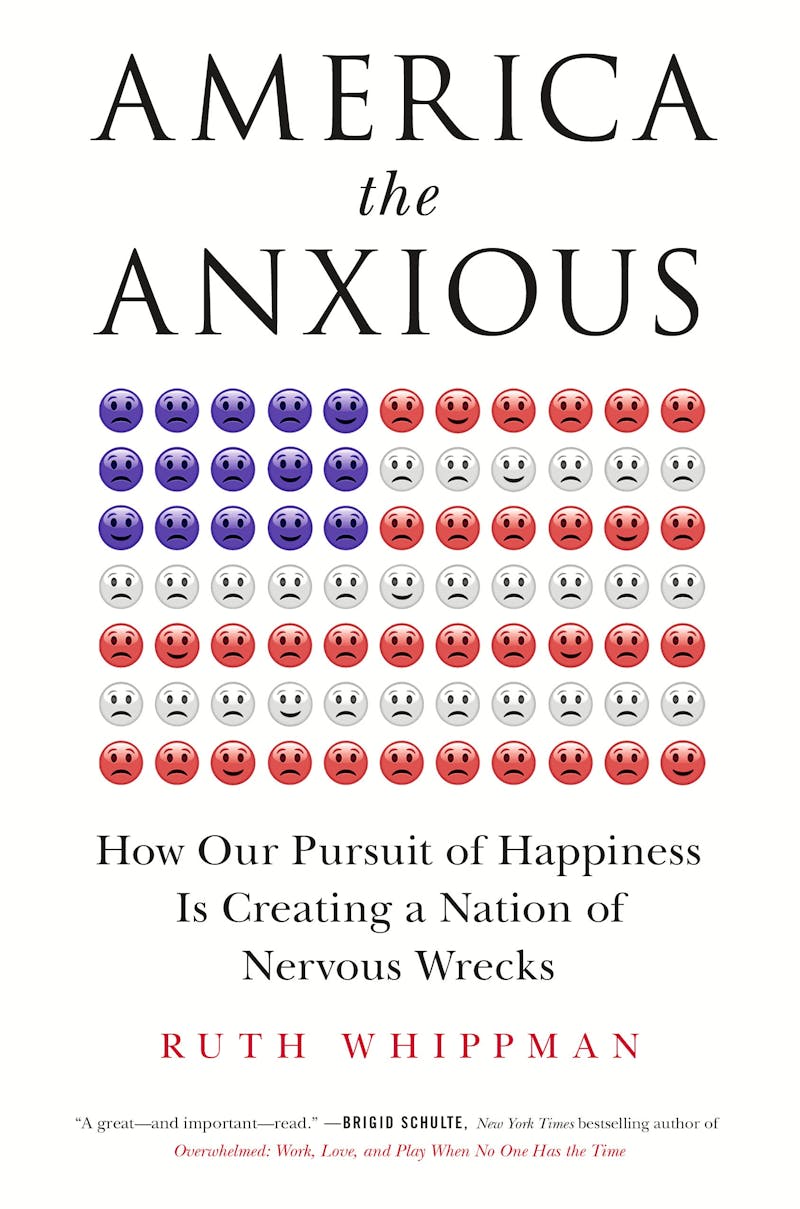To be a woman in our society is to be a permanent work-in-progress. This plays out through two different sets of pressures: First, there are the obvious ones—on fat women to be thin, say, or on single women to wed—where (often unsolicited) advice is aimed at women with traits that are unfairly stigmatized. Waiting surreptitiously behind those pressures, however, one finds a host of additional suggestions aimed at the very women who could, one might imagine, revel in smug self-satisfaction. Sometimes this second sort of advice will manifest itself as a specific instruction (for example, that a thin woman could always be a bit more toned). Other times, it’s more of an amorphous push towards self-improvement, physical but phrased in emotional terms.

One might suggest that women should just stop caring so much, except that not-caring is the ultimate perfectibility requirement. Which has made the cult of perfection a target in a new strain of female-authored, largely female-oriented and often light-hearted writing. I’m thinking of Marisa Meltzer’s 2013 Elle story about the hidden nature of contemporary dieting (hidden, that is, behind a cover of “juice fasts and Goop cleanses and barre classes”), and Ruby Tandoh’s more recent Vice piece on wellness and orthorexia. Also of Rachel Hills’s 2015 book, The Sex Myth, which pushes against the notion that there’s a correct amount of sex everyone should be having. Comedy writer Jessi Klein has a pro-epidural screed in her new book of essays, You’ll Grow Out Of It. Of natural childbirth, she remarks: “No one ever asks a man if he’s having a ‘natural root canal.’ No one ever asks if a man is having a ‘natural vasectomy.’”
Perfection quests are defined by their inherent unattainability. The new wellness advice isn’t (just) about thinness; it urges a constant attentiveness to the provenance and nutritional attributes of every ingredient. As a project, though, happiness is that much more amorphous than “wellness,” demanding one’s full attention not just at mealtimes and during workouts, but all the time. And it’s that incessant quality that makes America the Anxious, Ruth Whippman’s new book about America’s obsession with happiness, so necessary.
As with other installments in the perfection-rejection subgenre, Whippman’s book addresses the pressures on those who are doing all right to do even better. The “happiness” she writes about at the start of the book isn’t the absence of sadness, but a quasi-spiritual level of delight. Indeed, unless one sticks with a limited definition of happiness—that is, as the absence of clinical depression—the category is about creating a problem where none existed. If you’re in a good enough mood most of the time, do you need to strive to make yourself even happier? Writes Whippman: “Workaday contentment starts to give way to a low-grade sense of inadequacy when pitched against capital “H” Happiness. The goal is so elusive and hard to define, it’s impossible to pinpoint when it’s even been reached, a recipe for anxiety.” Like skincare products that aim not to address specific dermatological needs but rather to achieve better skin, the happiness industry encourages us to chase an ideal of self-improvement.”
Perfection quests don’t just leave those on them feeling inadequate and involve writing for-profit entities big checks. In a chapter with the wonderful title, “Personal Journey? It’s Not All About You,” Whippman interviews psychologist and researcher Dr. Iris Mauss, who criticizes many happiness quests for “‘self-focus.’” Mauss elaborates: “‘You can spend so much time focusing on what you are feeling that you just don’t have time to focus on others.’” Whichever perfection-seeking sinkhole a person—generally a woman—finds herself in, the hours she devotes to pondering her own flaws is time she’s not spending out in the world, accomplishing things or simply enjoying herself.
The book’s starting point is Whippman’s own experiences as a trailing spouse. About five years ago, she gave up her job making documentaries for television in London so that her husband could pursue a tech career in Silicon Valley. She writes about lonely days at home with their baby, and the (Facebook-fueled) angst of new motherhood. Anecdotal observations of her new neighbors’ happiness pursuits lead her to read up a bit on American “happiness-seeking culture,” at which point her “journalistic curiosity kicks in,” and she decides to apply her background as an investigative reporter to get a deeper picture of American happiness-chasing. (And also—although this goes unstated—to re-launch her own career, a move that has, anecdotally, been known to increase a woman’s happiness.)
She visits self-help workshops, but some sources are more serendipitous—her husband befriends a “devout Mormon” at work, thus offering Whippman, “half-Jewish” and agnostic, a glimpse of family life in a culture very unlike her own. Research she cites supports what her reporting and personal anecdotes suggest, namely that “men are significantly happier than women, and the women who do the most ‘women-y’ type things, stay-at-home mothers, are the least happy of all.”
That’s not to say Whippman’s point is that the obligation to find happiness doesn’t impact men as well. Throughout the book, we meet plenty of male happiness seekers, including a Zappos executive so committed to positivity that he decides to “ban the word ‘don’t,’” and so enthusiastic about his employer that, prior to coming on board, he worked for the company unpaid for nine months despite his high rank. Whippman takes us on a tour of bosses who offer a (supposedly) fun environment in exchange for long hours and low pay. She also meets underprivileged middle school students forced to reveal private struggles to their classmates as part of a happiness-promoting program, reminiscent of the “privilege” walk exercises aimed at their older and less needy counterparts. And the bleakest moment in the narrative, a tour of suicides associated with Las Vegas’s start-up country, is about a handful of deeply unhappy men.
Still, the demand to appear happy falls disproportionately on women, from service-sector positions where a smile is part of the job (as Arlie Russell Hochschild details in her seminal work The Managed Heart) to those upscale enclaves where women have plenty of spare time to dwell on emotional matters. Whippman writes about both situations, interviewing Hand to Mouth author Linda Tirado to learn about expectations placed on fast-food workers, but also describing a new friend she’d made in bourgeois California who prioritized yoga and self-improvement workshops over hanging out.
There’s no one type of woman—no demographic category—that is somehow immune to the pressure to be chipper. It impacts the sort of young white women who seem to have it all (Whippman discusses the Penn student with the upbeat Instagram feed who nonetheless committed suicide), as well as black women, who—as Zerlina Maxwell noted in an article about Sandra Bland’s death—“are stereotyped as aggressive or angry, and this poisons every single interaction they have.” “Joy hunting,” Whippman tells us, is not “just the ultimate luxury for a privileged bunch of high-income Californians.” If anything, the happiness demand impacts otherwise-marginalized women the most.
I especially appreciated Whippman’s takedown of “empowerment,” which she calls “the consolation prize for those of us who will never have any actual power.” She doesn’t spell out the gender implications, but they’re hard to miss: “Creating a Tumblr of photos of your post-C-section wobbling and scarred naked stomach? Empowering! Creating a Tumblr of photos of your post-prostate-surgery rectum? Not so much.”
Why an anti-perfection-quest trend in women’s writing, why now? Demands that women be perfect aren’t new. What’s new—and what, I suspect, has inspired this backlash—is the emphasis these days on effortlessness, in beauty and in other arenas. (The latest hot new parenting book asks parents to reject “parenting,” the verb, altogether, and to try by not trying.) The “effortlessness” turn has had its plusses: We are fortunate enough to live in the age of stretch waistbands, when sneakers have replaced stilettos as the moment’s coveted accessories. Effortless-chic is sometimes genuine pushback against perfectionism, but on the occasions it’s not, it’s perfectionism in its most nefarious form. Not-caring has become its own meta-demand.
Another reason for the trend is—and this one’s unavoidable—the fact that women’s first-person writing sells. The confessional turn in women-oriented writing, for all its sisterhood-solidarity comforts, can be exploitative. Meanwhile, anti-perfection lit may be the least fraught sort of personal writing. All that’s being “confessed” is that one is a regular human being—not a trait that will count as a liability for future employers and so forth. This is a realm of self-deprecating humor, not self-sabotage.
It’s certainly possible to condemn the perfection requirement without invoking or focusing on one’s own struggles (as in Madeleine Schwartz’s spot-on parody of the shares-her-routine beauty-writing genre), but the topic lends itself to a personal telling. It helps to believe we’re hearing from a woman who was on, or at least felt as if she ought to be on, one of these perfection quests, to offset the gentle (or less-than-gentle) mockery of those other women, their earnest perfection-seeking counterparts. Thus why it’s important that we learn, early on in America the Anxious, that Whippman’s interest in self-help and happiness came out of a lonely period in her life, after relocating to the States from the UK with her family. By implicating herself, Whippman avoids coming across as snide or dismissive of her subjects.
The reader first meets Whippman at the gynecologist’s. I wasn’t sure what to make of that choice of opener. Would a man begin a critique of the US economy with a trip to his urologist? My ambivalence, however, lasted only until the second page: Her doctor’s mid-exam small talk involves praising a self-help guide. “I’ve read that book too,” Whippman writes, “and am suddenly overcome with crippling self-consciousness. I hope desperately that my gynecologist is not currently reading the part about how in order to achieve true happiness, it is advisable to give total mental focus to how everything around you smells.” No, a man probably wouldn’t have written that. But readers are lucky someone did.
